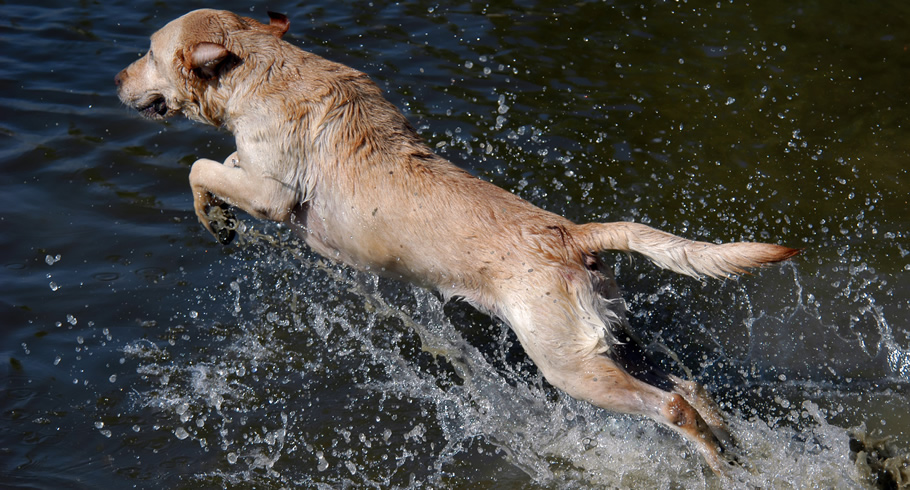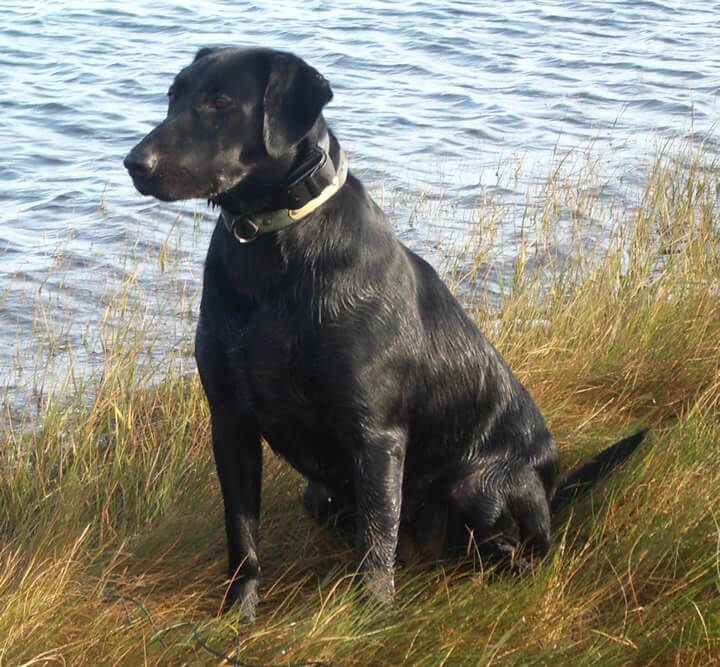
If you don’t get anything else from LabsnDucks, get this — a hunting dog is an athlete. I did not say athletic. I said athlete.
If you soften him up around the house you’ve got to keep him in shape with outdoor conditioning and not just a week or a month before the season. Your dog needs exercise year round. It’s not fair to the dog to do anything less. It could even cost his life.
A published report in Ducks Unlimited online stated, “A recent survey by the Association for Pet Obesity Prevention found that 54 percent of our nation’s dogs are either overweight or obese. Unfortunately, that troubling statistic includes retrievers and sporting dogs.”
Even if you’re just a casual duck hunter you will put your retriever in challenging situations including:
In short, we don’t duck hunt in the park. In fact, the best honey holes are usually hell holes. Your dog’s physical ability will dictate his hunting ability. An out of shape dog won’t trail a wounded bird to completion or have the stamina to make consecutive long retrieves. Retrieves while hunting vary from marathons, to fifty yard dashes, to sprinting and stopping, and sprinting again after a running bird. When training, mix long retrieves with medium length retrieves and rapid-fire successive short retrieves that require sprinting.

Conditioning improves muscle development and tone, bone strength, overall power and stamina on land and in water. It keeps your dog mentally strong and alert, and it improves his ability to deal with cold weather. Not to mention adding years to his life.
Training and hunting also put mental stress on the dog. If he is not up to the physical challenge it is harder for him to be up to the emotional challenge. A tired or over stressed dog also creates bad habits. Your job is challenging enough without having to compensate for unnecessary bad habits.
A tired lab ain’t having much fun. If your lab is not having fun while training, he is not going to learn. If he is not going to learn, why are you there??
And keep the age of your dog in mind when conditioning him. A puppy’s bones and muscle systems are not fully developed and pups don’t have much stamina to begin with. Older dogs have their own set of physical concerns. Be smart about the current condition of your dog as you try to improve the overall condition of your dog. Note: I give my dogs a glucosamine supplement and while I can’t offer definitive proof, I sure do believe it makes a big difference.
A hard charging lab will expend effort on heart alone with no real awareness of his personal safety. You told him to fetch. He’s going to go fetch – or at least try. But if he is not physically up to it, you may be putting him in harm’s way. Do not mistake enthusiasm for energy. Do not over work your dog trying to force him into shape quickly. It is counterproductive and can cause injury.
No duck is worth sending your dog on a retrieve that pushes safety limits and puts his life at risk. Floating ice and high waves are danger zones. DO NOT LET THE FACT THAT YOU ARE A MACHO KIND OF GUY (or girl) PUSH YOUR DOG BEYOND SAFETY LIMITS CAUSED BY TERRAIN CONDITIONS OR HIS PHYSICAL LIMITATIONS. If a bird sails even a short distance that requires your dog to maneuver through unsafe water, do not send the dog. That’s not wanton waste, that’s common sense. If conditions don’t allow safe retrieves, case your gun and take out your camera. And be smart when a friend says, “Hey, that’s my first mallard and I think it’s banded and isn’t this what labs do anyway?” NO. Your friend will shoot other mallards. Hunt to common sense levels, not your testosterone levels.
In hot weather, listen to your dog’s tongue. Watching how your dog’s tongue hangs out of his mouth and how much saliva drips will tell you when he needs a drink and when it’s time to stop running altogether. Carry water and keep your dog hydrated. Obviously, swimming is ideal exercise making retrievers the easiest dogs to condition in hot weather. In my twist of the old adage, “You can lead a lab to water… but you can’t keep him out if it!” Be mindful than even when in cool water, hot weather still requires extra attention to your dog’s condition at the moment. Even when swimming, dogs can still ‘heat up’ internally. Short, controlled walks are also very beneficial. Hot weather in-of-itself is no excuse for keeping your dog in your air conditioned living room.
Do not take your dog from your warm bedroom to hunt in freezing temperatures unless you have conditioned him to cold weather. When the temperature begins to fall I will leave my dogs in the outdoor kennel for appropriate periods of time to get them accustomed to being in the cold. It builds up their coat and I believe is a healthy regimen. Duck hunting dogs do more sitting around than running or swimming after birds. When hunting in cold weather, be sure you let your dog run around as appropriate in between cold water retrieves and after sitting still for the length of time it takes you to drop a bird. Bring a bumper while hunting and throw it for him during long waits. And remember, dogs need to be hydrated in cold weather too.
Condition your canine athlete like his life depends on it.